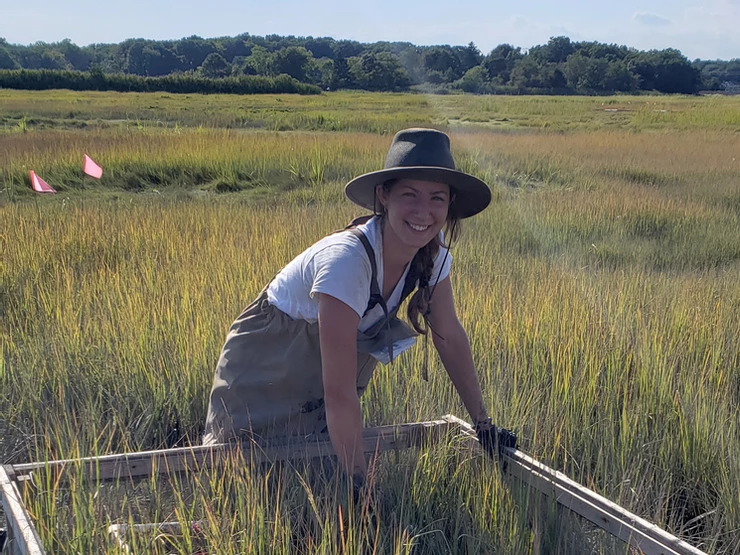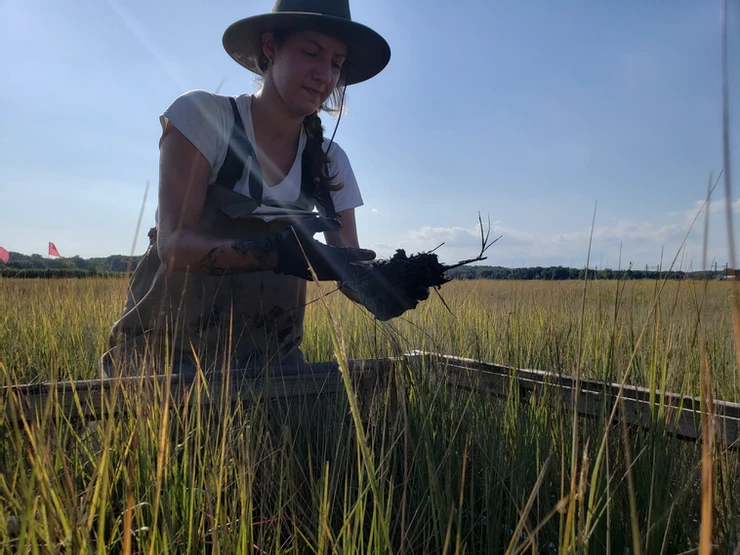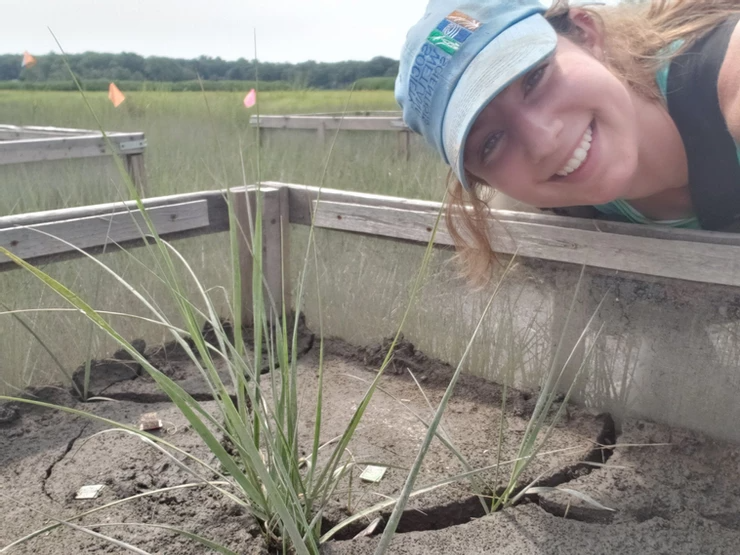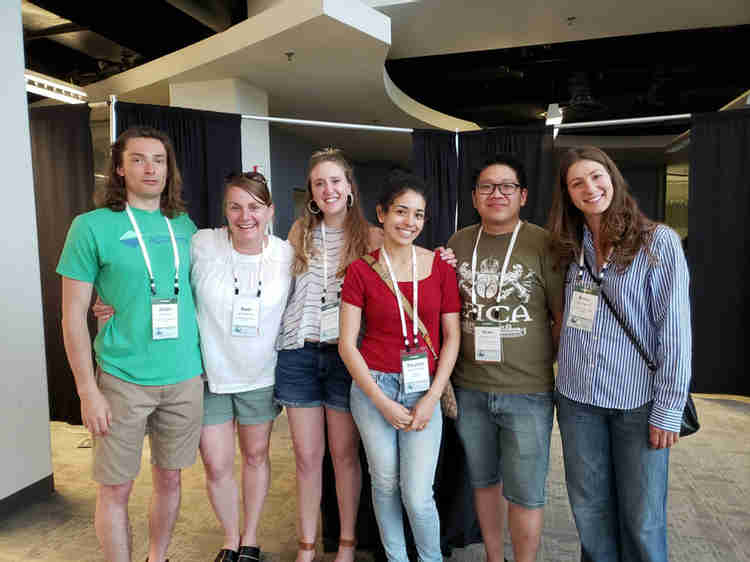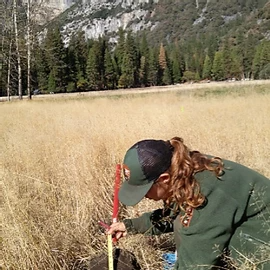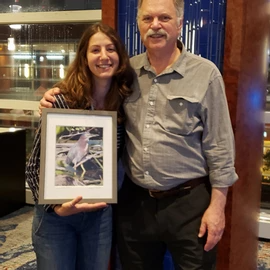
Student Spotlight: Running to make a difference
Anna Puchkoff is running for election to the SWS E-Board as Secretary General! She is the only student on the ticket. We caught up to talk about her journey from city girl to wetland scientist, Twitter expert (@AnnaPuchkoff), and up-and-coming SWS leader.
Q: Where and what are you currently studying?
A: I am at the University of Connecticut studying under Beth Lawrence. Together, we are working to understand how we can mitigate climate change impacts to coastal wetlands in wetland restoration and what techniques promote wetland resiliency. We are looking at how using thin layer placement of sediment on drowning coastal marshes affect plant productivity and carbon cycling processes. With these results, I plan to inform local management about potential restoration outcomes, and provide long term monitoring for plant and soil responses to support further research.
Q: How did you get into wetlands?
A: I don't think I can pinpoint a wetland origin story, but I do know that I was always adventurous, and that nature led me to follow the direction of my curiosity. I grew up in NYC, and while it seems like it would not be a nature inspiring place, I think the lack thereof made me more drawn and curious about natural systems. Living in Staten Island, "the borough of parks," I would get out whenever I could to explore what felt like a whole other world from everything else that surrounded it. My mother worked as an environmental educator at the local park, which allowed me to roam about and exposed me to these areas that I would not otherwise be able to access. From there I became more aware and concerned with general environmental issues, but my deeper appreciation for our interconnected ecosystems began in school which paved the way for my pursuit as a resource management major in college. My interest in wetlands specifically began in my junior year wetland conservation class. The class covered the importance of ecosystem services such as pollution filtration and carbon sequestration that wetlands provide, and how they are severely undervalued and ubiquitously degraded. On weekly field trips my professor, Dr. Robert Shannon, had us dig a soil pit and identify hydric soil features. As we watched the gleying colors oxidize before our eyes, I was fascinated. It was magic! I wanted to know more about these unique systems - how are they able to do such magnificent things? What components of the system support these functions, and why? How can we protect these systems, and restore degraded ones? This led me to pursue an internship opportunity at my university's wetland research center, Riparia, and subsequent wetland related positions. After 5 years in the workforce, I returned to school for graduate research. At the 2018 SWS Annual meeting in Denver, I met my (soon to be) advisor Dr. Beth Lawrence, whose presentation and research interests incited me to follow up with her.
A: When I was an undergrad, my advisor was the president for the SWS Wetland Certification Program (SWSCP) and encouraged us to sign up to gain credibility entering the job market, as well as attend the SWS Mid-Atlantic Region conference that was being hosted that year at my university. That first meeting was when I knew I was where I needed to be. There was an entire ballroom of other people that were all fascinated and have dedicated their life's work to understanding and expanding our knowledge of wetlands for greater protection and conservation. Just by being there I got to learn so much from them. I got to answer some questions I already had, and be inspired to develop new questions I didn't even know I could think of. This was when I knew I wanted to join SWS and increase my network of people to learn from, to be inspired by, and to feel understood by when it comes to working towards a common goal. Joining SWS has increased the diversity of people and the diversity of wetland systems I have learned from, and through these experiences, I feel that I am able to see new ecological perspectives in environmental issues. I actually met my research match at an SWS annual meeting and started working with my current graduate research advisor. I found opportunities to get more involved with SWS efforts by responding to a call for volunteers to promote the SWS New Media Initiative. From there, I worked with other dedicated members and the executive board to promote the SWS mission through soliciting videos for expanding wetland science knowledge to the public. This also led to joining an incredible committee of people working on the Twitter Symposium to increase access to wetland science content to the public and the international wetland community. Through these efforts and others, I was able to connect, learn from, and support other members' work.
Q: What made you decide to run for the position of Secretary General?
A: I have really enjoyed working on those initiatives - seeing the benefit they have for members and the public - and this is a big reason why I decided to run for SWS Secretary General. I was initially intimidated by the prospect, as we all may experience the imposter syndrome of graduate school (do I even qualify to be here, to do this?!). However I was encouraged by Beth Middleton, SWS Immediate Past President, to pursue the election. The more I thought about it, I realized there was no reason not to, so - why not? I hope that as an innate public servant, a student, and supporter of SWS, I can have the opportunity to represent all members and advance the SWS mission.
Society of Wetland Scientist Elections are now open, and will close on Monday, April 20th. Make sure to cast your vote before then!
